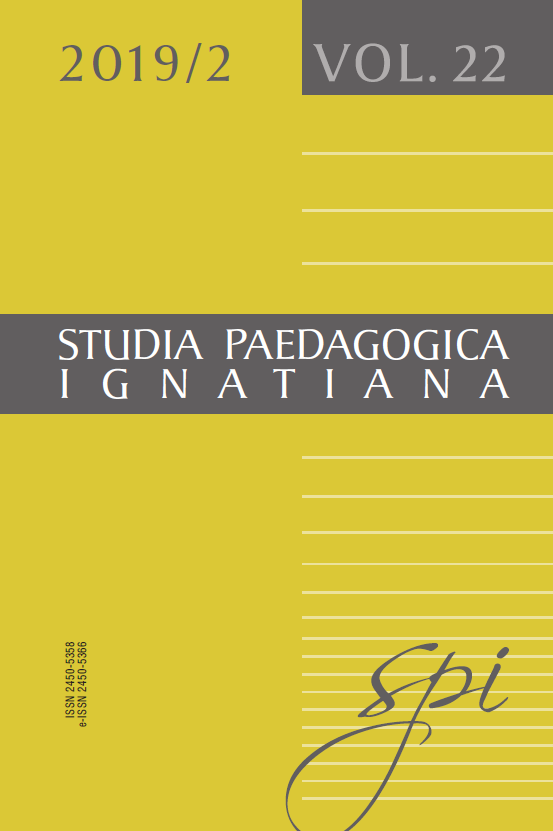Personalistic Approach in Education as a Way for Developing Culture Based on Values
DOI:
https://doi.org/10.12775/SPI.2019.010Keywords
education, personalism, dialogue, “black pedagogy”, violenceAbstract
The article presents an analysis of the selected thoughts of existential philosophers and philosophers of dialogue, with particular emphasis on the views of J. Tischner, T. Gadacz and M. Buber, to show that thanks to the personalistic approach in education, it is possible to build a culture based on values such as freedom, dialogue, respect, tolerance and love. In order to emphasize the personalism, I will show views worked out by the researcher of “black pedagogy” – Alice Miller, who presents how destructive violence experienced during childhood is for a child, and in a wider perspective, for the culture. In my preparation of the issue, I used the method of the analysis of existing materials and the synthesis method. The central categories around which the considerations are conducted are: child, education, freedom, violence. Personalism emphasizes a person as an autonomous human being, its dignity and rationality. In turn, “black pedagogy” refers to research on the influence of mental violence on the child’s mind. Using mechanisms of repression in their childhood leads to tremendous human and cultural deterioration. An education based on a personalistic approach in education is the key to building a culture based on freedom, dialogue, respect, tolerance, love.
References
Ablewicz K., Człowiek jako metodologiczny problem pedagogiki, „Horyzonty Wychowania” 2002, nr 1, s. 87–202.
Buber M., Ja i Ty. Wybór pism filozoficznych, przeł. J. Doktór, „Pax”, Warszawa 1992.
Buber M., Wychowanie, przeł. S. Grygiel, „Znak” 1968, nr 166, s. 442–461.
Christiane F., My dzieci z dworca ZOO, przeł. R. Turczyn, Wydawnictwo Iskry, Warszawa 1987.
Dziewiecki M., Wychowanie a wolność, https://opoka.org.pl/biblioteka/I/IP/wolosc.html [dostęp: 09.01.2018].
Fromm E., Ucieczka od wolności, przeł. O. i A. Ziemilscy, Czytelnik, Warszawa 2007.
Gadacz T., Wolność a odpowiedzialność. Rosenzweiga i Levinasa krytyka Heglowskiej wolności ducha, Papieska Akademia Teologiczna w Krakowie, Kraków 1998.
Gadacz T., Wolność i odpowiedzialność, http://p-ntzp.com/dok/09gadacz-p.pdf
[dostęp: 07.01.2018].
Gadacz T., Wychowanie do wolności, „Znak” 1993, nr 460 (9), s. 97–107.
Kiereś B., Współczesna pedagogika a problem godności człowieka, w: Personalistyczny wymiar filozofii wychowania, red. A. Szudra i K. Uzar, Wydawnictwo KUL, Lublin 2009, s. 188.
Kijowski A., Dopiski do „Wyznań” św. Augustyna, „W Drodze” 1985, nr 3.
Korczak J., Jak kochać dziecko. Prawo dziecka do szacunku, Czarna Owca, Warszawa 2006.
Miller A., Zniewolone dzieciństwo. Ukryte źródła tyranii, przeł. B. Przybyłowska, Media Rodzina, Poznań 1999.
Stróżewski W., O stawaniu się człowiekiem, kilka myśli niedokończonych, „Zeszyty Naukowe Uniwersytetu Jagiellońskiego. Prace Pedagogiczne” 1987, z. 6, s. 36–41.
Sztompka P., Czas społeczny, czas biograficzny, czas pedagogiczny, „Zeszyty Naukowe Uniwersytetu Jagiellońskiego. Prace Pedagogiczne” 1987, z. 6, s. 91–94.
Śliwerski B., Z perspektywy pedagogiki personalistycznej, „Edukacja i Dialog” 1996, nr 6, s. 13–18.
Tischner J., Etyka wartości i nadziei, w: D. von Hildebrand, J.A. Kłoczowski, J. Paściak, J. Tischner, Wobec wartości, W drodze, Poznań 1984, s. 96.
Downloads
Published
How to Cite
Issue
Section
License
By submitting an article, the author declares that:
they are the author of the article (hereinafter referred to as the Work) and:
- is entitled to exclusive and unlimited copyright to the Work,
- is entitled to dispose of the copyrights to the Work.
The Author grants the Jesuit University Ignatianum in Cracow a free, non-exclusive, territorially unlimited license to use the Work in the following fields of exploitation:
- publishing the Work in paper, digital or magnetic form;
- multiplying the work by any method, without limiting the number of editions or copies;
- distribution of the work and its copies in any form, including marketing, sales, lending, and lease;
- placing the work in a computer memory;
- distribution of the work in information networks, including the Internet;
- public performance, exhibition, display, reproduction, broadcasting and re-broadcasting, as well as making the Work available to the public in such a manner that everyone could have access to it at a time and place chosen by themselves;
- within the scope of dependent rights to the Work, covering, in particular, the right to make necessary changes to the Work, resulting from editorial and methodical preparation, as well as to make translations of the Work into other languages.
The license right shall be transferred the moment of transfer of the Work to the Jesuit University Ignatianum in Cracow. The Jesuit University Ignatianum in Cracow is entitled to grant sub-licenses to the Work in terms of the right granted. The license shall be limited in time for a period of 15 years from the date it is granted.
Stats
Number of views and downloads: 735
Number of citations: 0



